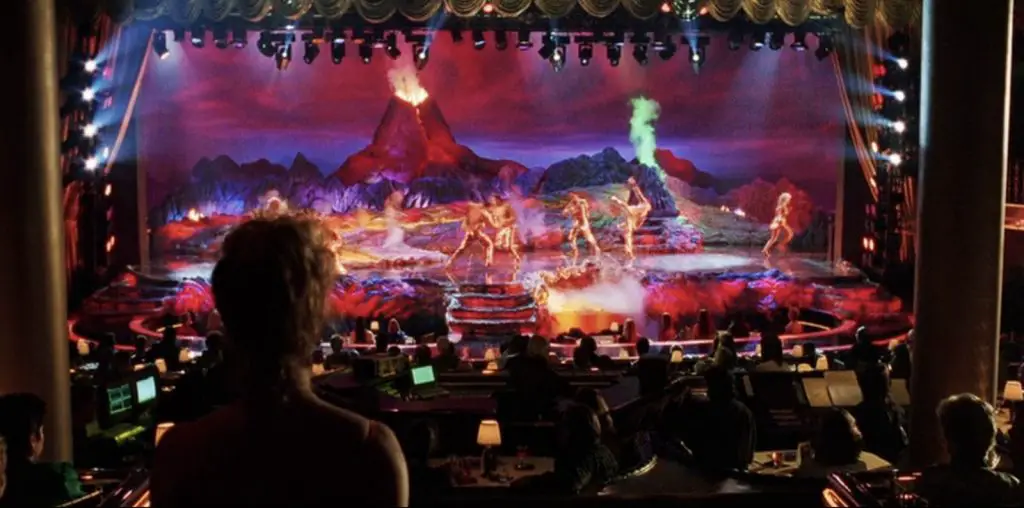
Whatever you think of Spike Lee, when he has the faith in his talent and material and is able to be political without the dogma, he’s one of the best filmmakers to come out of America in the 1980’s. Unfortunately, everything doesn’t gel together too often, but it does in “Summer of Sam”. What is it? Essentially, it’s a coming-of-age film, but of the Bronx.
What we think of as America and American life only developed in the 20th century with the advent of infrastructure and a big government that built roads and took care of you if you couldn’t. American culture was quite childlike through the ’50’s where we believed what the government told us and viewed the world through a naive, narrow, moralistic filter. The 1960’s were a period of adolescent rebellion. The ’70’s were a time young adulthood. Cut loose from the old, moral structure, freedom was something to be explored. An understanding of the dangers, repercussions, and responsibilities would only come later.
1977 was a cultural crossroads for America. Most people only seem to remember that as the year when “Star Wars” was first released, but so were “Eraserhead”, “Smokey and the Bandit”, and “Saturday Night Fever”. Elvis died. The Sex Pistols released “Never Mind the Bollocks…” and broke up, but punk rock was making inroads, even as disco would soon hit its peak.
For many residents of the insular Bronx, NY, the 1970’s were something they ignored on TV. Many lived there and worked there, right beside their families, and rarely ventured outside “home”.
In Lee’s “Summer of Sam”, there’s no talk of Jedis, and the only elements of the era to blossom were disco and drugs. New York Newsday columnist Jimmy Breslin introduces the film by describing the real obsessions of that time. Reggie Jackson takes the Yankees to the World Series; a record summer heatwave soon causes a massive, citywide blackout followed by looting; and more importantly, a madman randomly hunts and kills on the street and will soon by known as “the Son of Sam”.
Lee gives us cross-section of characters, almost none of whom escape the summer unchanged. Vinnie and Dionna (John Leguizamo and Mira Sorvino) are a young married couple, doing okay but with a few problems. Vinnie, like most of the men on display, hasn’t emotionally developed past age 13, and can’t view women outside of a rigid “Madonna/w***e” paradigm. As he has a hankerin’ for sex anal, oral, and sloppy, he has sex with nearly every other woman within reach to fulfill the desires he can’t bring himself to do with his wife. As such, their sex life sucks.
Fulfilling the “w***e” role is Ruby (Jennifer Esposito). Having found sex as the only way to get anyone to pay attention to her, she must now endure the mantle of the neighborhood slut, particularly from Vinnie’s less developed friends, led by smalltime drug dealer and thug, Joey T. (Michæl Rispoli).
Salvation and disturbance comes in the form of Vinnie’s best friend Ritchie (Adrien Brody), newly returned to the neighborhood as a full-blown punk rocker, even sporting a really fake British accent. He doesn’t care what anyone in the neighborhood thinks of him, and he treats Ruby like an actual person. However, when away from home, he’s involved in some activities that would truly freak out his childhood acquaintances.
The killings have put everyone on edge, though. Local mafioso Luigi (Ben Gazzara) has put a price on the head of “Sam” and Joey T. and the idiot squad convince themselves that the killer MUST live in the neighborhood. They start a list of everyone they view as freaks as suspects, and Ritchie is at the top of the list. Meanwhile, if Vinnie can’t get past both his unchecked carnal desires and his childish, Catholic view of women, that marriage is going to have some SEVERE problems.
I was reminded of two films while watching “Summer of Sam”. “Looking for Mr. Goodbar” (again, 1977!) starring Diane Keaton, and “Last Exit to Brooklyn”. “Goodbar” is a cautionary tale of the dangers lurking in the sexual landscape of the singles scene. “Last Exit to Brooklyn”, based on Hubert Selby Jr.’s novel, demonstrates the need for and the dangers of human connection in a world where loyalty is valued but compassion is not, and dissent is swiftly punished. It’s not just that both “Sam” and “Last Exit” feature a band of violent idiots. Like “Last Exit”, “Summer of Sam” doesn’t have the clearest story arcs for each character. The point of the film is that the summer is the gauntlet each character must run through. No one is likely to reach the other side unbattered. In a tense environment, the tests of character can come fast, but by the time many of the characters see the tests, they’ve already failed.
As true of many a Spike Lee Joint, the womenfolk could have used a tad more development, the film is mainly about Vinnie and Ritchie. Vinnie must escape the juvenile moral and social framework that’s crushing him and learn to take responsibilities for his actions. Ritchie must determine what the new one is after jettisoning the old one whole. Both must learn the repercussions of their behavior to themselves and others and when not to run away from their problems. Each man has a sort of secret life. The difference is, Vinnie shares his with his friends but hides it from his mate. Ritchie desperately hides his secrets from the neighborhood but needs to share them with the willing Ruby, happy to be anywhere but the Bronx.
Gotta give credit to Spike and Director of Photography Ellen Kuras, the movie sure looks and feels like a 70s flick. Thanks to Spike it’s as good as the ones we haven’t blotted from memory, as well.
